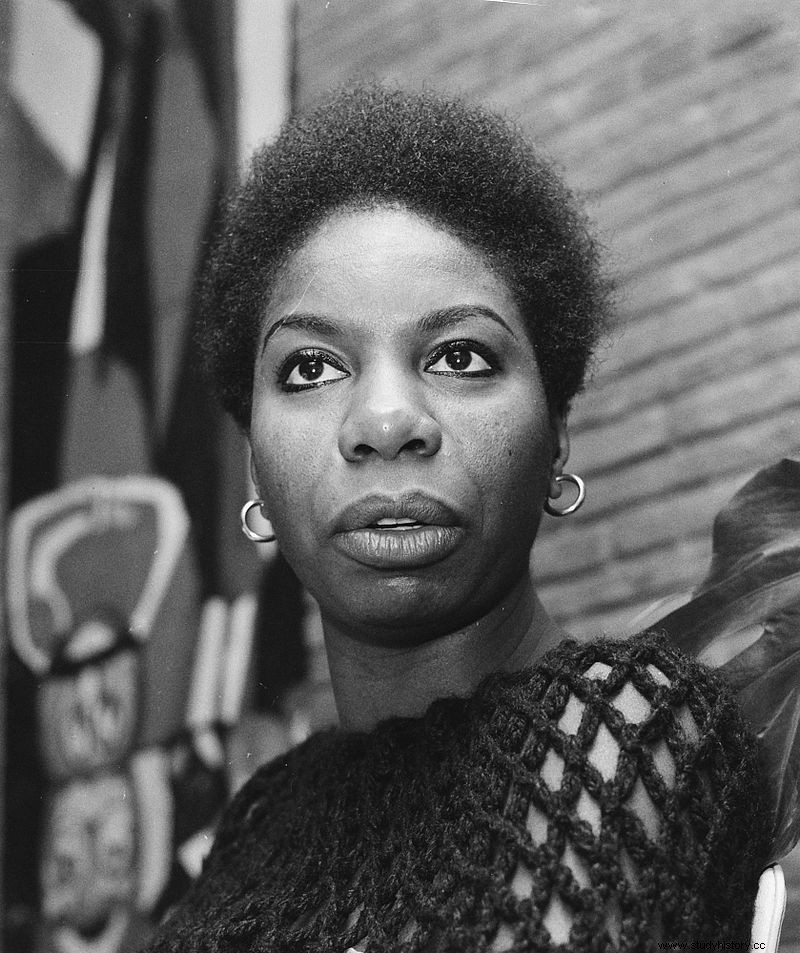Eunice Kathleen Waymon, known as Nina Simone (1933 – 2003), is a famous American musician, singer and songwriter. Besides her artistic career, she has also been a major civil rights activist in the United States.
The first recital

Born February 21, 1933 in Tryon, North Carolina, Eunice was the sixth child of housekeeper Mary Kate Waymon and dry cleaner John Davan Waymon; they will have two other children thereafter. Hit by the crisis of 1929, his parents work hard but their financial situation worsens and they live in one of the poorest neighborhoods of the city.
Eunice began to learn the piano at a very young age, at the age of three, and quickly demonstrated a real talent for music and singing, which she practiced in church. With her teacher Muriel Massinovitch "Miss Mazzy", she trained intensely and practiced the piano three hours a day, dreaming of becoming the first black classical concert performer.
At the age of twelve, she gave her first recital in church, disturbed by a racist incident:her parents were forced to give up their place in the front row to white people and settle in the back. Eunice then refuses to play until her parents can come back and sit in front.
The Curtis Institute
At the same age, Miss Mazzy announced that she had nothing more to teach Eunice and the young artist was sent to a girls' boarding school, from which she graduated as valedictorian in 1950. Thanks to various financial supports, she moved to New York to take courses at the Juilliard School of Music, with a view to entering the prestigious Curtis Institute. The only black student in her promotion, she was not received there and was left with disappointment and resentment.
After working for a while with a photographer, she started as a pianist-accompanist with a singing teacher, before setting up on her own. With the money she earns, she pays for private lessons with Professor Sokhaloff of the Curtis Institute. To finance her lessons, she plays and sings jazz, blues and classical music in a bar in Atlantic City; it was then, in 1954, that she chose the stage name Nina Simone to hide her activity from her parents. Little by little, she created her style and made herself known. The following year, her mother, very religious, cut ties after learning the type of music played by her daughter.
Committed songs against racism and racial inequalities
Nina Simone ends up being spotted by a New York talent agent, who offers her a contract. She begins to perform in New York clubs and, signing a contract with the King Records label, records her first disc. She recorded a first disc of fourteen titles in a single day. She then signed with the record company Colpix Records, with which she recorded several albums. On stage and in her records, she goes from blues to jazz, gospel, folk, and classical.
In 1961, Nina married Andrew Stroud, with whom she had a daughter the following year. In 1964, she signed a contract with the Dutch record company Philips, and then began, from the first album, to openly address the problems of racism and racial inequality in the United States. She evokes the assassination of Medgar Evers, the attack in a church in Birmingham, the laws on racial segregation. She became more and more involved in the civil rights movement, speaking at large meetings (such as the Selma March), performing many works denouncing segregation and favoring a non-violent revolutionary approach as Martin Luther wishes. King.
I Put a Spell on You
In 1970, Nina Simone left the United States and her husband, who had become her manager, for Barbados. On her return, she discovers that she is wanted for unpaid taxes – which she refuses to pay in protest against the United States' involvement in Vietnam – and shelters herself from prosecution by returning to Barbados, then by settling successively in Liberia, Switzerland, the Netherlands, then France. In 1974, then in 1978, she recorded two new albums. The same year, she was briefly arrested for her refusal to pay her taxes.
At the beginning of the 1980s, Nina stayed in Paris and gave a few performances there in small venues. In 1984, she recorded a new album in a jazz club in London. In 1992, she published her autobiography, I Put a Spell on You . The following year, she recorded her last album.
Nina Simone then moved to the south of France. In 1999, she was rewarded for her entire work at the music award in Dublin. She appeared on stage for the last time in July 2002 in Poland.
Nina Simone died of illness on April 21, 2003.
